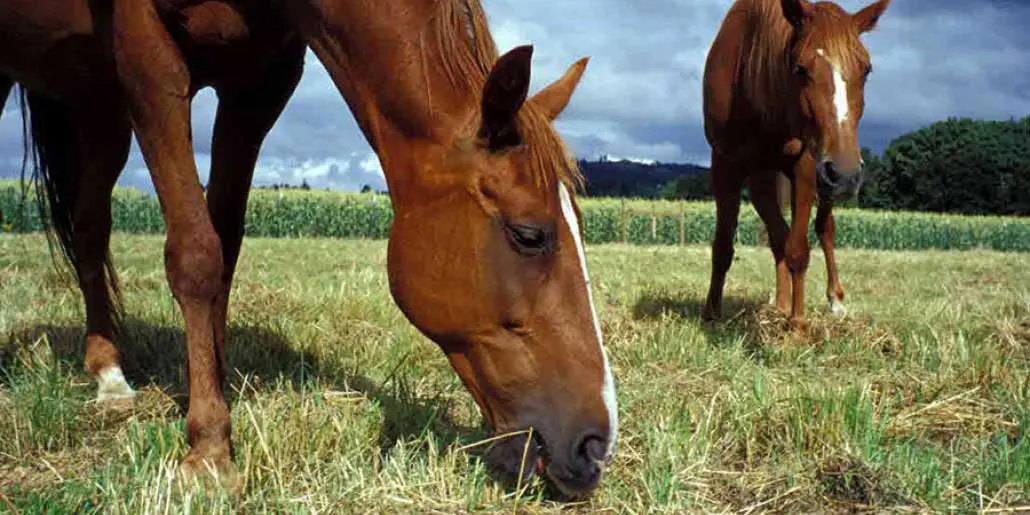equine health
Common Questions
At Ford Veterinary Surgery Center we are committed to providing our clients with a high-quality equine dental technician service, and to abide by the American Veterinary Medical Association performance guidelines.
Call For An Appointment
Have A Question?

10 Tips for Caring for the Older Horse
Because of advances in nutrition, management and health care, horses are living longer, more useful lives. It’s not uncommon to find horses and ponies living well into their 20s and 30s. While genetics play a role in determining life span, you too, can have an impact....
10 Tips for Choosing the Best Hay for Your Horse
High-quality hay can be an important source of essential nutrients in your horse’s diet. A horse’s protein and energy requirements depend on age, stage of development, metabolism and workload. A mature horse will eat 2 to 2.5% of its body weight a day, and for optimum...
10 Tips for Preventing Colic
The number one killer of horses is colic. Colic is not a disease, but rather a combination of signs that alert us to abdominal pain in the horse. Colic can range from mild to severe, but it should never be ignored. Many of the conditions that cause colic can become...
10 Tips for Reducing Your Horse’s West Nile Risk
Since first being recognized in the United States in 1999, West Nile virus (WNV) has posed a serious threat to horses and humans alike. In the equine population, the virus is transmitted when a mosquito takes a blood meal from a bird infected with WNV, then feeds on a...
10 Tips for Weight Reduction in the Overweight Horse
As a horse owner, you play an important role in controlling your equine companion’s weight. Sound nutrition management, a regular exercise program and veterinary care are key to keeping your horse fit and healthy. Maintaining the ideal weight is not always easy,...
Be Prepared for an Equine Health Emergency
If you own horses long enough, sooner or later you are likely to confront a medical emergency. From lacerations to colic to foaling difficulties, there are many emergencies that a horse owner may encounter. You must know how to recognize serious problems and respond...
Don’t Skip the Purchase Exam
Owning a horse can be a big investment in time, money and emotion. Unfortunately, horses seldom come with a money-back guarantee. That’s why it is so important to investigate the horse’s overall health and condition through a purchase exam conducted by an equine...
Help Your Foal Grow with Proper Nutrition
A healthy foal will grow rapidly, gaining in height, weight and strength almost before your eyes. From birth to age two, a young horse can achieve 90 percent or more of its full adult size, sometimes putting on as many as three pounds per day. Feeding young horses is...
Help Your Mare Have a Safe Delivery
If your mare has made it through 11 months of pregnancy, you’re almost home free. Labor and delivery, while momentous, are generally uneventful. In most cases, you will simply need to be a quiet observer – if, that is, you are lucky enough to witness the birth. Mares...
Learn to Recognize the Signs of Laminitis
Every day veterinarians across the country see hundreds of cases of laminitis, a painful disease that affects the feet of horses. Laminitis results from the disruption of blood flow to the sensitive and insensitive laminae within the foot, which secure the coffin bone...
Learn to Recognize the Symptoms of EPM
Equine Protozoal Myeloencephalitis (EPM) is a master of disguise. This serious disease, which attacks the horse’s central nervous system, can be difficult to diagnose because its signs often mimic other health problems in the horse and signs can range from mild to...
Learn to Recognize Your Horse’s Dental Problems
Horses with dental problems may show obvious signs, such as pain or irritation, or they may show no noticeable signs at all. This is because some horses simply adapt to their discomfort. For this reason, periodic dental examinations are essential to your horse’s...
Protect Your Horse from EIA
Equine Infectious Anemia (EIA) is a potentially fatal disease that threatens the world’s horse, donkey and mule populations. The virus that causes EIA reproduces in the white blood cells that circulate throughout the body. The immune system, via antibodies, may attack...
Understanding Your Horse Insurance Responsibilities
Whether a horse is purchased for personal or business reasons, ownership represents a significant investment of time, money and resources. While no one likes to think about the potential for tragedy, horses seem to be prone to illness, accidents and injury. Should...
Wage War on Equine Parasites
Internal parasites are silent killers. They can cause extensive internal damage, and you may not even realize your horses are heavily infected. At the very least, parasites can lower resistance, rob the horse of valuable nutrients, and cause gastrointestinal...
